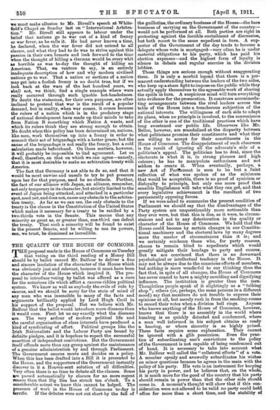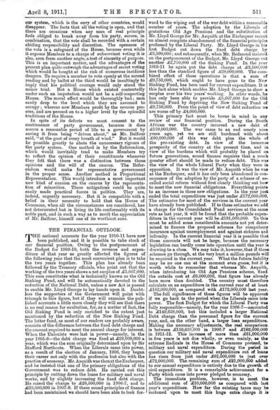THE QUALITY OF THE HOUSE OF COMMONS.
THE proposal made in the House of Commons on Tuesday that voting on the third reading of a Money Bill should be by ballot caused Mr. Balfour to deliver a fine and sincere laudation of the character of the House which was obviously just and relevant, because it must have been the character of the House which inspired it. The pro- posal to introduce voting by ballot was offered as a cure for the notorious ills which afflict a caucus-ridden political system. We know as well as anybody the evils of rule by caucus, and we should be sorry for the state of mind of any man who was insensible to many of the facts and arguments brilliantly applied by Lord Hugh Cecil in his support of the proposal. But we believe with Mr. Balfour that the ballot would introduce more diseases than it would cure. First let us say exactly what the diseases are. The very ardour of modern political life and the careful organisation of class interests have produced a kind of syndicating of effort. Political groups like the Irish Nationalists and the Labour Party are bound by definite pledges, and it is hopeless to expect the successful assertion of independent convictions. But the Government itself offends more than any group against the maintenance of a genuine administration by and through Parliament. The Government caucus meets and decides on a policy. When this has been drafted into a Bill it is presented to the House, and the supporters of the Government instantly discover in it a Heaven-sent solution of all difficulties. Very often there is no time to debate all the clauses. Some are passed automatically by closure for no more cogent reason than that Big Ben has struck ten o'clock. To a considerable extent we know this cannot be helped. The pressure of work in the House of Commons to-day is terrific. If the debates were not cut short by the fall of the guillotine, the ordinary business of the House—the bare business of carrying on the Government of the country— would not be performed at all. Both parties are right in protesting against the forcible curtailment of discussion, but both resort to the same expedient in turn. A sup- porter of the Government of the day tends to become a delegate whose vote is mortgaged—very often he is under material obligations to his party, which has paid his election expenses—and the highest form of loyalty is silence in debate and regular exercise in the division lobbies.
These things are serious enough without exaggerating them. It is only a morbid legend that there is a per- manent understanding between the leaders of the two sides, who keep up a sham fight to impose on the public while they actually apply themselves to the agreeable work of sharing the spoils in turn. A suspicious mind will turn everything into evidence for the prosecution. It construes accommoda- ting arrangements between the rival leaders across the table of the House into a treacherous subjection of the national interests. The willingness of each side to adapt its plans, when no principle is involved, to the convenience of the other is one of the traditional practices which have long sweetened our public life. Observers like Mr. Belloc, however, are scandalised at the disparity between what politicians promise their constituents and what they are willing to accept for their constituents in the House of Commons. The disappointment of such observers is the result of ignoring all the advocate's side of a politician's appeal. The politician has to deal, since the electorate is what it is, in strong phrases and high colours ; he has to manipulate enthusiasm and not seldom to create it. When eventually, perhaps, a new Act of Parltiment is seen to be but a faint reflection of what was spoken of as the minimum that would be acceptable, there is no proof of cynicism or disloyalty to principle, but only one more proof that sensible Englishmen will take what they can get, and that every legislative achievement is the resultant of two permanently opposing forces. If we were asked to summarise the present condition of Parliament we should say that the disadvantages of the Party system are unquestionably more noticeable than they ever were, but that this is due, as it were, to circum- stances and not to any deterioration in the quality or character of the House of Commons. We hold that the House could become by certain changes in our Constitu- tional machinery and the electoral laws by many degrees more the master of circumstances than it is ; and we certainly condemn those who, for party reasons, choose to remain blind to expedients which would greatly mitigate their bondage to party and caucus. But we are convinced that there is no downward psychological or intellectual tendency in the House. It may not be always due to the conscious efforts of members, but nothing is more wonderful to our thinking than the fact that, in spite of all changes, the House of Commons has never ceased to have a mighty moulding and dignifying influence. The institution is greater than the men. Thoughtless people speak of it slightingly as a " talking shop "; others (or, perhaps, the same persons in a different mood) say that members do not trouble to express their opinions at all, but merely rush in from the smoking-rooms to record their votes when a division bell rings. Anyone who knows anything of the House of Commons, however, knows that there is no assembly in the world where humbug is so quickly detected and condemned, where a man well informed in his subject obtains so ready a hearing, or where sincerity is so highly prized. These facts require some explanation. They cannot be ignored with a glib pessimism. Even the prac- tice of subordinating one's convictions to the policy of the Government is not capable of being condemned out of hand. It is necessary to take into account what Mr. Balfour well called the " collateral effects " of a vote. A member openly and avowedly subordinates his wishes on minor questions because he agrees in the main with the policy of his party. His vote is an instrument for keeping his party in power, and he believes that, on the whole, it is much more for the good of the country that his party should remain in power than that the other side should come in. A moment's thought will show that if this con- sideration were not allowed to be valid no party could hold office for more than a short time, and the stability of our system, which is the envy of other countries, would disappear. The facts that all the voting is open, and that there are occasions when any man of real principle feels obliged to break away from his party, secure, in combination, that the vote shall be recorded with a certain abiding responsibility and discretion. The openness of the vote is a safeguard of the House, because even while it exposes Members to a charge of subservient voting it is also, seen from another angle, a.test of sincerity of purpose. This is an important matter, and the advantages of the present plan quite outweigh the advantages of secret voting which would be bought at the risk of numerous insidious dangers. To require a member to vote openly at the second. reading and by ballot at the third would be insultingly to imply that his political courage would only stand the minor trial. But a House which existed contentedly under such an imputation would not be a self-respecting House. The moral effect would be thoroughly bad ; men easily drop to the level which they are assumed. to occupy ; whereas now Members profit by the reverse pro- cess, and are pressed on to a higher level by the splendid traditions of the House.
In spite of its defects we must consent to the continuance of party government, because it does assure a reasonable period of life to a government by saving it from being " driven about," as Mr. Balfour said, at the gust of every breath of wind." But it would be possible greatly to abate the unnecessary rigours of the party system. One method is by the Referendum, which would. inevitably tend to make Members try to reflect the opinion of their constituents whenever they felt that there was a distinction between those opinions and the will of the caucus. The Refer- endum would make for representative government in the proper sense. Another method is Proportional Representation. This wou14. introduce a most important new kind of suasion on the caucus by the representa- tion of minorities. These mitigations could be quite easily made practical forces in politics. They are, indeed, urgently necessary. But it is compatible with a belief in their necessity to hold that the House of Commons, when all the circumstances are considered, has not deteriorated but is living its life conformably with its noble past, and in such a way as to merit the appreciation of Mr. Balfour, himself one of its worthiest sons.











































 Previous page
Previous page